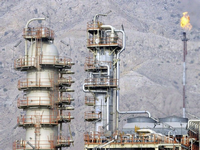For years, analysts have argued that the Nabucco natural gas pipeline -- a U.S.-backed effort to transport gas from the Caspian Sea to Europe via Turkey, thus bypassing Russia -- needed to accept gas from Iran if it was to be economically viable. But Iranian involvement in the project, which is intended to reduce European energy dependence on Russian gas exports, has been anathema for U.S. policymakers: Washington's efforts to thwart Iran's ambitions have so far overridden its desire to thwart Russia's. That may be changing. The White House has appointed a new envoy for Eurasian Energy, Richard Morningstar, who worked on energy diplomacy in the Clinton administration and has a reputation as a savvy diplomat. Morningstar played a crucial role in shepherding through the last big U.S. move in the Central Asian energy game, the Baku-Tbilisi-Ceyhan oil pipeline. At an energy conference in Bulgaria at the end of April, Morningstar refused to rule out Iranian involvement in Nabucco, and suggested that opening up the Iranian energy sector could be a "carrot" for improving relations on other issues.
The Nabucco Carrot and U.S.-Iran Engagement

